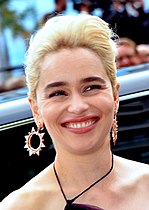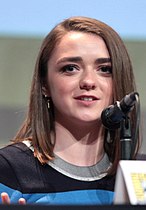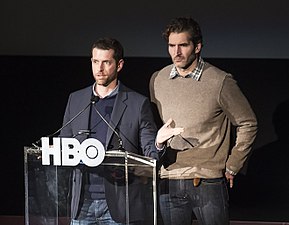Game Of Thrones
Game of Thrones is an American fantasy drama television series created by David Benioff and D. B. Weiss for HBO. It is an adaptation of A Song of Ice and Fire, a series of fantasy novels by George R. R. Martin, the first of which is A Game of Thrones. The show premiered on HBO in the United States on April 17, 2011, and concluded on May 19, 2019, with 73 episodes broadcast over eight seasons.
Set on the fictional continents of Westeros and Essos, Game of Thrones has a large ensemble cast and follows several story arcs throughout the course of the show. The first major arc concerns the Iron Throne of the Seven Kingdoms of Westeros through a web of political conflicts among the noble families either vying to claim the throne or fighting for independence from whoever sits on it. The second focuses on the last descendant of the realm's deposed ruling dynasty, who has been exiled to Essos and is plotting to return and reclaim the throne. The third follows the Night's Watch, a military order defending the realm against threats from beyond Westeros' northern border.
Game of Thrones attracted a record viewership on HBO and has a broad, active, and international fan base. Critics have praised the series for its acting, complex characters, story, scope, and production values, although its frequent use of nudity and violence (including sexual violence) has been subject to criticism. The final season received significant criticism for its reduced length and creative decisions, with many considering it a disappointing conclusion. The series received 59 Primetime Emmy Awards, the most by a drama series, including Outstanding Drama Series in 2015, 2016, 2018 and 2019. Its other awards and nominations include three Hugo Awards for Best Dramatic Presentation, a Peabody Award, and five nominations for the Golden Globe Award for Best Television Series – Drama.
A prequel series, House of the Dragon, premiered on HBO in 2022.
Premise
Plot
See also: Synopsis of A Song of Ice and Fire and World of A Song of Ice and Fire
Game of Thrones is roughly based on the storylines of the A Song of Ice and Fire book series by George R. R. Martin, set in the fictional Seven Kingdoms of Westeros and the continent of Essos.[5][6] The series follows several simultaneous plot lines.[7] The first story arc follows a war of succession among competing claimants for control of the Iron Throne of the Seven Kingdoms, with other noble families fighting for independence from the throne. The second concerns the exiled scion's actions to reclaim the throne; the third chronicles the threat of the impending winter, as well as the legendary creatures and fierce peoples of the North.[8]
Cast and characters
Main article: List of Game of Thrones characters
Game of Thrones has an ensemble cast which has been estimated to be the largest on television.[9] In 2014, several actors' contracts were renegotiated to include a seventh-season option.[10] By the final season, five of the main cast members made $1 million per episode, making them among the highest paid television performers.[11][12]
Eddard "Ned" Stark (Sean Bean) is the head of House Stark. He and his wife, Catelyn (Michelle Fairley), have five children: Robb (Richard Madden), Sansa (Sophie Turner), Arya (Maisie Williams), Bran (Isaac Hempstead-Wright), and Rickon (Art Parkinson). Ned also has an illegitimate son, Jon Snow (Kit Harington), who, along with his scholarly friend, Samwell Tarly (John Bradley), serve in the Night's Watch under Lord Commander Jeor Mormont (James Cosmo). The Wildlings living north of the Wall include Gilly (Hannah Murray) and the warriors Tormund Giantsbane (Kristofer Hivju) and Ygritte (Rose Leslie).[13]
Others associated with House Stark include Ned's ward Theon Greyjoy (Alfie Allen), Ned's vassal Roose Bolton (Michael McElhatton), and Roose's illegitimate son, Ramsay Snow (Iwan Rheon). Robb accepts help from the healer Talisa Maegyr (Oona Chaplin), while elsewhere, Arya befriends blacksmith's apprentice Gendry Rivers (Joe Dempsie) and assassin Jaqen H'ghar (Tom Wlaschiha). In the Stormlands, the tall warrior Brienne of Tarth (Gwendoline Christie) is introduced to Catelyn.
In King's Landing, Ned's friend, King Robert I Baratheon (Mark Addy), shares a loveless political marriage with Cersei Lannister (Lena Headey). Her younger twin brother, Ser Jaime (Nikolaj Coster-Waldau), serves on the Kingsguard while their younger brother Tyrion (Peter Dinklage) is attended by his mistress Shae (Sibel Kekilli) and mercenary Bronn (Jerome Flynn). Cersei's father is Tywin (Charles Dance), head of House Lannister and richest man in Westeros. Cersei has two sons: Joffrey (Jack Gleeson) and Tommen (Dean-Charles Chapman). Joffrey is guarded by the scar-faced warrior Sandor "The Hound" Clegane (Rory McCann).[14]
The king's Small Council includes his treasurer, Petyr "Littlefinger" Baelish (Aidan Gillen), and his spymaster, Varys (Conleth Hill). In Dragonstone, Robert's younger brother, Stannis (Stephen Dillane), is advised by foreign priestess Melisandre (Carice van Houten) and former smuggler Ser Davos Seaworth (Liam Cunningham). In the Reach, the Tyrell family is led by matriarch Olenna (Diana Rigg) and represented at court by her granddaughter Margaery (Natalie Dormer). The High Sparrow (Jonathan Pryce) is given power as a religious leader, while, in Dorne, the warrior Ellaria Sand (Indira Varma) seeks vengeance against the Lannisters.[13]
Across the Narrow Sea in Pentos, siblings Viserys Targaryen (Harry Lloyd) and Daenerys Targaryen (Emilia Clarke) (colloquially referred to as "Dany") are in exile, with the former plotting to reclaim his father's throne. Daenerys is forced into marrying Khal Drogo (Jason Momoa), a leader of the nomadic Dothraki. Her retinue eventually comes to include the exiled knight Ser Jorah Mormont (Iain Glen), her aide Missandei (Nathalie Emmanuel), mercenary Daario Naharis (Michiel Huisman), and elite soldier Grey Worm (Jacob Anderson).[13]
- Main cast and characters

- Peter Dinklage (Tyrion Lannister)
-

- Lena Headey (Cersei Lannister)
-

- Nikolaj Coster-Waldau (Jaime Lannister)
-

- Emilia Clarke (Daenerys Targaryen)
-

- Kit Harington (Jon Snow)
-

- Sophie Turner (Sansa Stark)
-

- Maisie Williams (Arya Stark)
-

- Isaac Hempstead Wright (Bran Stark)
-

- Iain Glen (Jorah Mormont)
-

- Alfie Allen (Theon Greyjoy)
Themes
Main article: Themes in A Song of Ice and Fire
The series has been praised by both television critics and historians for what was perceived as a sort of medieval realism.[15][16][17] George R. R. Martin set out to make the story feel more like historical fiction than contemporary fantasy, with less emphasis on magic and sorcery and more on battles, political intrigue, and the characters, believing that magic should be used moderately in the epic fantasy genre.[18][19][20] Martin has said that, "the true horrors of human history derive not from orcs and Dark Lords, but from ourselves".[21] Academics have classified the series as neo-medieval which focuses on the overlapping of medieval history and popular fantasy.[22][23][24] A common theme in the fantasy genre is the battle between good and evil, which Martin says does not mirror the real world.[25] Martin explores the relationship between good and evil through the questions of redemption and character change.[26] The series allows the audience to view different characters from their perspective, unlike in many other fantasies.[20][27]
In early seasons, under the influence of the A Song of Ice and Fire books, main characters were regularly killed off, and this was credited with developing tension among viewers.[28] Martin stated in an interview that he wanted to depict war and violence in a realistic way, which sometimes mean the hero or main characters could be injured or killed.[29] In later seasons, critics pointed out that certain characters had developed "plot armor" to survive in unlikely circumstances and attributed this to Game of Thrones deviating from the novels to become more of a traditional television series.[28] In a 2012 study, out of 40 recent television drama shows, Game of Thrones ranked second in deaths per episode, averaging 14.[30] A scientific study conducted in 2018 stated that about 60% of the major characters died as a result of violence and war.[31]
Inspirations and derivations
Although the series's first season closely follows the events of the first novel, there were significant changes made for later seasons. According to Benioff, the TV adaptation is "about adapting the series as a whole and following the map George laid out for us and hitting the major milestones, but not necessarily each of the stops along the way".[32] Aspects of the novels' plots and their adaptations are based upon settings, characters, and events in European history.[33] Most of Westeros is reminiscent of high medieval Europe, from its geography and castles to its cultures, the feudal system, palace intrigues, and the knights' tournaments.[34][35] Like medieval Europe, most of the houses in the series use the patriarchal system of power.[36] The series also includes elements of gothic fiction, including torture tropes.[37]
A principal inspiration for the novels is the English Wars of the Roses (1455–1485) between the houses of Lancaster and York, reflected in Martin's houses of Lannister and Stark.[38] The scheming Cersei Lannister evokes Isabella, the "She-Wolf of France" (1295–1358).[33] She and her family, as portrayed in Maurice Druon's historical novel series, The Accursed Kings, were a main inspiration of Martin's.[39] Other historical antecedents of series elements include: Hadrian's Wall (which becomes Martin's Wall), the Roman Empire, and the legend of Atlantis (ancient Valyria), Byzantine Greek fire ("wildfire"), Icelandic sagas of the Viking Age (the Ironborn), the Mongol hordes (the Dothraki), the Hundred Years' War, and the Italian Renaissance.[33] The series's popularity has been attributed, in part, to Martin's skill at fusing these elements into a seamless, credible version of alternate history.[33][40]
Production
Conception and development
 Showrunners D. B. Weiss and David Benioff created the series, wrote most of its episodes and directed several.
Showrunners D. B. Weiss and David Benioff created the series, wrote most of its episodes and directed several.
The A Song of Ice and Fire series of novels was popular before Game of Thrones.[41] The series has sold more than 90 million copies worldwide with the novels being translated into 45 different languages.[42][43] George R. R. Martin received multiple fantasy writing awards and nominations, including a World Fantasy Award and multiple Locus Awards, for the series.[44] Writing for Time magazine in 2005 after the release of A Feast for Crows, journalist Lev Grossman called Martin the "American Tolkien", stating he is a "major force for evolution in fantasy".[45]
In January 2006, David Benioff had a telephone conversation with Martin's literary agent about the books he represented. Having been a fan of fantasy fiction when he was younger, he became interested in A Song of Ice and Fire, which he had not read. The literary agent sent Benioff the series's first four books.[46] Benioff read a few hundred pages of the first novel, A Game of Thrones, shared his enthusiasm with D. B. Weiss, and suggested that they adapt Martin's novels into a television series; Weiss finished the first novel in "maybe 36 hours".[47] They pitched the series to HBO after a five-hour meeting with Martin (himself a veteran screenwriter) in a restaurant on Santa Monica Boulevard. According to Benioff, they won Martin over by knowing the answer to his question, "Who is Jon Snow's mother?"[48]
I had worked in Hollywood myself for about 10 years, from the late '80s to the '90s. I'd been on the staff of The Twilight Zone and Beauty and the Beast. All of my first drafts tended to be too big or too expensive. I always hated the process of having to cut. I said, 'I'm sick of this, I'm going to write something that's as big as I want it to be, and it's going to have a cast of characters that go into the thousands, and I'm going to have huge castles, and battles, and dragons.'
— George R. R. Martin, author[49]
Before being approached by Benioff and Weiss, Martin had had meetings with other scriptwriters, most of whom wanted to adapt the series as a feature film. Martin, however, deemed it "unfilmable", saying that the size of one of his novels is as long as The Lord of the Rings, which had been adapted as three feature films.[49] Benioff agreed it would be impossible to turn the novels into a feature film as their scale is too big for a feature film, and dozens of characters would have to be discarded. Benioff added, "a fantasy movie of this scope, financed by a major studio, would almost certainly need a PG-13 rating. That means no sex, no blood, no profanity. Fuck that."[20] Martin was pleased with the suggestion that they adapt it as an HBO series, saying that he "never imagined it anywhere else".[50]
The series began development in January 2007.[5] HBO acquired the television rights to the novels, with Benioff and Weiss as the series' executive producers and Martin as a co-executive producer. The intention was for each novel to yield a season's worth of episodes.[5] Initially, Martin would write one episode per season while Benioff and Weiss would write the rest.[5] Jane Espenson and Bryan Cogman were added later to write one episode each for the first season.[51] The first and second drafts of the pilot script by Benioff and Weiss were submitted in August 2007[52] and June 2008,[53] respectively. Although HBO liked both drafts,[54] a pilot was not ordered until November 2008.[55] The pilot episode, "Winter Is Coming", was shot in 2009; after its poor reception following a private viewing, HBO demanded an extensive re-shoot (about 90 percent of the episode, with cast and directorial changes).[48][56] The pilot reportedly cost HBO $5–10 million to produce,[57] while the first season's budget was estimated at $50–60 million.[58] For the second season, the series received a 15-percent budget increase for the climactic battle in "Blackwater" (which had an $8 million budget).[59][60] Between 2012 and 2015, the average budget per episode increased from $6 million[61] to "at least" $8 million.[62] The sixth-season budget was over $10 million per episode, for a season total of over $100 million, a record for a series's production cost.[63] By the final season, the production budget per episode was estimated to be $15 million.[64]
Casting
Nina Gold and Robert Sterne were the series' primary casting directors.[65] Through a process of auditions and readings, the main cast was assembled. The only exceptions were Peter Dinklage and Sean Bean, whom the writers wanted from the start; they were announced as joining the pilot in 2009.[66][67] Other actors signed for the pilot were Kit Harington as Jon Snow, Jack Gleeson as Joffrey Baratheon, Harry Lloyd as Viserys Targaryen, and Mark Addy as Robert Baratheon.[67] According to Benioff and Weiss, Addy was the easiest actor to cast for the series because of his audition performance.[68] Some characters in the pilot were recast for the first season. The role of Catelyn Stark was played initially by Jennifer Ehle, but the role was recast with Michelle Fairley.[69] The character of Daenerys Targaryen was also recast, with Emilia Clarke replacing Tamzin Merchant.[70] The rest of the first season's cast was selected in the second half of 2009.[71]
Although many of the cast returned after the first season, the producers had many new characters to cast in each of the following seasons. Because of the large number of new characters, Benioff and Weiss postponed introducing several key characters in the second season and merged several characters into one, or assigned plot functions to different characters.[9] Some recurring characters were recast over the years; for example, Gregor Clegane was played by three different actors, while Dean-Charles Chapman played both Tommen Baratheon and a minor Lannister character.[72]
Writing
 George R. R. Martin, author of A Song of Ice and Fire, is a series co-executive producer and wrote one episode for each of the first four seasons.
George R. R. Martin, author of A Song of Ice and Fire, is a series co-executive producer and wrote one episode for each of the first four seasons.
Game of Thrones used seven writers over its six seasons. Benioff and Weiss wrote most of each season's episodes.[73] A Song of Ice and Fire author George R. R. Martin wrote one episode in each of the first four seasons. Martin did not write an episode for the later seasons, since he wanted to focus on completing the sixth novel (The Winds of Winter).[74] Jane Espenson co-wrote one first-season episode as a freelance writer.[75]
Cogman, initially a script coordinator for the series,[75] was promoted to producer for the fifth season. Cogman, who wrote at least one episode for the first five seasons, was the only other writer in the writers' room with Benioff and Weiss.[73] Before Cogman's promotion, Vanessa Taylor—a writer during the second and third seasons—worked closely with Benioff and Weiss. Dave Hill joined the writing staff for the fifth season after working as an assistant to Benioff and Weiss.[76] Although Martin was not in the writers' room, he read the script outlines and made comments.[73]
Benioff and Weiss sometimes assigned characters to particular writers; for example, Cogman was assigned to Arya Stark for the fourth season. The writers spent several weeks writing a character outline, including what material from the novels to use and the overarching themes. After these individual outlines were completed, they spent another two to three weeks discussing each main character's individual arc and arranging them episode by episode.[73] A detailed outline was created, with each of the writers working on part of it to create a script for each episode. Cogman, who wrote two episodes for the fifth season, took a month and a half to complete both scripts. They were then read by Benioff and Weiss, who made notes, and parts of the script were rewritten. All ten episodes were written before filming began since they were shot out of order by two units in different countries.[73] Benioff and Weiss wrote their episodes together; one wrote the first half of the script with the other writing the second half. They then passed the drafts back and forth to make notes and do rewrites.[50]






















































